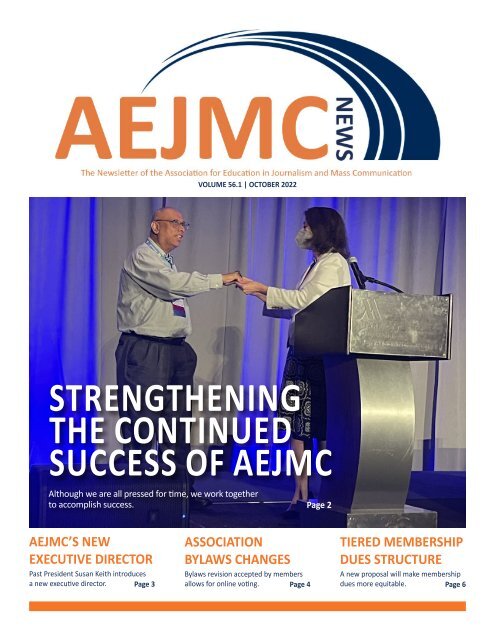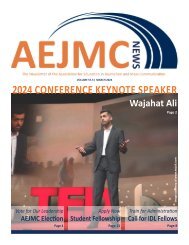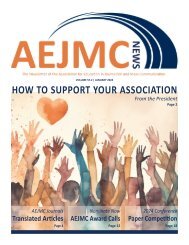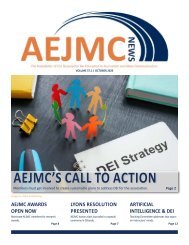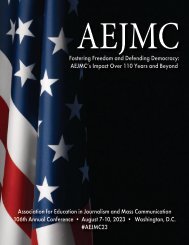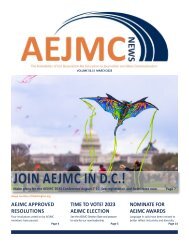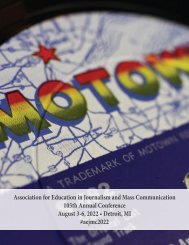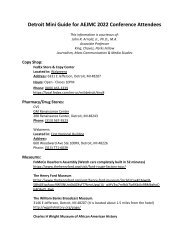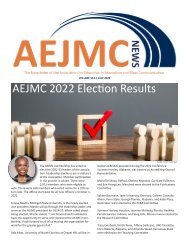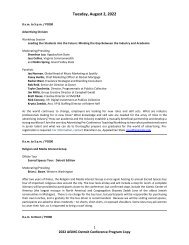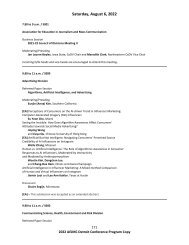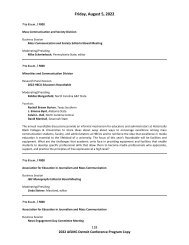AEJMC News-October 2022
AEJMC's October newsletter
AEJMC's October newsletter
- No tags were found...
Create successful ePaper yourself
Turn your PDF publications into a flip-book with our unique Google optimized e-Paper software.
<strong>AEJMC</strong> NEWS, JANUARY <strong>2022</strong> | PAGE 1<br />
VOLUME 56.1 | OCTOBER <strong>2022</strong><br />
STRENGTHENING<br />
THE CONTINUED<br />
SUCCESS OF <strong>AEJMC</strong><br />
Although we are all pressed for time, we work together<br />
to accomplish success.<br />
Page 2<br />
<strong>AEJMC</strong>’S NEW<br />
EXECUTIVE DIRECTOR<br />
ASSOCIATION<br />
BYLAWS CHANGES<br />
TIERED MEMBERSHIP<br />
DUES STRUCTURE<br />
Past President Susan Keith introduces<br />
Bylaws revision accepted by members<br />
A new proposal will make membership<br />
a new executive director. Page 3 allows for online voting. Page 4 dues more equitable.<br />
Page 6
PAGE 2 | <strong>AEJMC</strong> NEWS, OCTOBER <strong>2022</strong><br />
From the President<br />
LET US STRENGTHEN THE CONTINUED SUCCESS OF <strong>AEJMC</strong><br />
By Deb Aikat, University of North Carolina at Chapel Hill<br />
<strong>2022</strong>23 <strong>AEJMC</strong> President<br />
The <strong>AEJMC</strong> <strong>2022</strong> Detroit conference ratified the power of our <strong>AEJMC</strong><br />
community, besides accomplishing a Covidsafe conference. As we<br />
emerge from pandemic disruptions, let us strengthen the continued<br />
success of <strong>AEJMC</strong>.<br />
We have collectively contributed to <strong>AEJMC</strong>’s rise as a collegial, resolutely<br />
nonpartisan, interdisciplinary organization fostering excellence<br />
in education, research, and professional freedom, the three pillars of<br />
<strong>AEJMC</strong>. I have cherished the camaraderie and collective wisdom of<br />
<strong>AEJMC</strong> members like you.<br />
I feel honored, and humbled, that our peers elected me to serve as<br />
your <strong>2022</strong>23 <strong>AEJMC</strong> President. I joined <strong>AEJMC</strong> in 1992, as a PhD student<br />
at Ohio University. As a UNCChapel Hill faculty member since<br />
1995, I cherish every element of our <strong>AEJMC</strong> community. I enunciate, in<br />
this column, some compelling initiatives to enhance research, teaching,<br />
and the spirit of ethical freedom.<br />
In my 30 years as an <strong>AEJMC</strong> member, I have experienced the joys,<br />
trials, and tribulations of our field. To enhance <strong>AEJMC</strong>’s relevance, I am<br />
committed to advancing <strong>AEJMC</strong> priorities through six strategic steps:<br />
1. Enhance <strong>AEJMC</strong>’s commitment to scholarship and speaking truth to<br />
power: As we adapt to transforming media models in the 21 st century<br />
digital age, let us develop programs relevant to our <strong>AEJMC</strong> 2023 conference<br />
theme: “Fostering Freedom & Defending Democracy <strong>AEJMC</strong>’s Impact<br />
over 110 Years and Beyond.”<br />
2. Redefine <strong>AEJMC</strong>’s impact in the changing media ecosystem: <strong>AEJMC</strong><br />
was founded November 30, 1912, in Chicago, Illinois, as the American<br />
Association of Teachers of Journalism. To celebrate the 110 th anniversary<br />
of <strong>AEJMC</strong>, the <strong>AEJMC</strong> Board of Directors will meet Dec. 23, <strong>2022</strong>,<br />
in Columbia, SC, home to <strong>AEJMC</strong> headquarters since 1981. <strong>AEJMC</strong> can<br />
redefine the intellectual métier of JMC research and education in our<br />
pursuit of media that matters.<br />
3. Bolster the <strong>AEJMC</strong> brand within our field and beyond: Let us enhance<br />
<strong>AEJMC</strong>’s renown as a robust hub for research and our leadership<br />
as a premier alliance of JMC scholars. To that end, we are instituting<br />
task forces for three presidential initiatives:<br />
► <strong>AEJMC</strong> Undergraduate Research and Engagement<br />
(https://bit.ly/AEJugrad)<br />
► <strong>AEJMC</strong> Distinguished Fellows (https://bit.ly/AEJfellow)<br />
► <strong>AEJMC</strong> Legacy and Impact (https://bit.ly/AEJlegacy<br />
We were gratified to receive strong nominations and selfnominations<br />
for these taskforce initiatives. We will soon appoint taskforce members.<br />
4. Expand <strong>AEJMC</strong>’s ties with ASJMC: <strong>AEJMC</strong>’s sister organization, the<br />
Association of Schools of Journalism and Mass Communication<br />
(ASJMC), was founded in 1917. For the first time in our 105year<br />
shared history, the presidents of <strong>AEJMC</strong> and ASJMC are in the same<br />
school. UNCChapel Hill’s Hussman School of Journalism and Media is<br />
home to the <strong>2022</strong>23 ASJMC President Dean Raul Reis, and yours truly.<br />
Raul and I will work together to enhance <strong>AEJMC</strong>’s ties with ASJMC.<br />
5. Enrich the camaraderie of the <strong>AEJMC</strong> community: Let us boost<br />
<strong>AEJMC</strong>’s spirit and joie de vivre. We are proud to be part of <strong>AEJMC</strong>’s jocund<br />
and erudite community sharing a bond of scholarship as we commiserate<br />
budget cuts and navigate our busy lives. In our commitment to<br />
engage <strong>AEJMC</strong> members, I am collaborating with Jatin Srivastava, Ohio<br />
University, to convene events to engage <strong>AEJMC</strong> members all year round.<br />
6. Foster opportunities for equity and diversity: As a 2005 graduate of<br />
the <strong>AEJMC</strong>ASJMC Journalism Leadership Institute in Diversity, I have<br />
been impressed with the transformative power of diversity initiatives<br />
such as the Institute for Diverse Leadership and the Equity & Diversity<br />
Award. Let us continue to recognize innovative approaches for inclusion,<br />
equity, and diversity. We would cherish closer ties with the National<br />
Association of Black Journalists (NABJ) and the National<br />
Association of Hispanic Journalists (NAHJ), the two largest minority<br />
journalist associations in our field.<br />
In conclusion, let me share a moment of truth. Although we are all<br />
pressed for time, we work together to accomplish success. Like you, I<br />
firmly believe in the power of collective wisdom. One of the great<br />
benefits of <strong>AEJMC</strong> is we are a community of smart scholars. Together, we<br />
can do amazing things. To that end, I feel honored to serve as your<br />
<strong>AEJMC</strong> President to implement insights and ideas from <strong>AEJMC</strong> members<br />
like you.<br />
As we ratify our resolve to sustain the continued success of <strong>AEJMC</strong>, I<br />
acknowledge the contribution of our 202122 <strong>AEJMC</strong> President Susan<br />
Keith, Rutgers, and the <strong>AEJMC</strong> Central Office Team of Executive<br />
Director Amanda Caldwell (6 years with <strong>AEJMC</strong>), Assistant Director<br />
Felicia Brown (29 years), Website Content/Graphic Designer Kyshia<br />
Brown (27 years), Project Coordinator Lillian Coleman (36 years),<br />
Communications Director Samantha Higgins (10 years), and Office<br />
Assistant Melanie J. Harris (first year with <strong>AEJMC</strong>).<br />
As always, feel free to email me at da@unc.edu with your ideas and insights<br />
to strengthen the continued success of <strong>AEJMC</strong>. Let us stay engaged<br />
and connected. We value your contribution to <strong>AEJMC</strong>.
<strong>AEJMC</strong> NEWS, OCTOBER <strong>2022</strong> | PAGE 3<br />
From the Past President<br />
INTRODUCING <strong>AEJMC</strong>’S NEW EXECUTIVE DIRECTOR<br />
By Susan Keith, Rutgers University<br />
202122 <strong>AEJMC</strong> President<br />
The past three years have been a time of tremendous change for<br />
<strong>AEJMC</strong>. As I served as vice president, presidentelect and president of<br />
the association, we have weathered a pandemic and its financial consequences,<br />
two years of virtual annual conferences, and the retirement<br />
of our longtime executive director, Jennifer McGill. We are emerging<br />
from this period of transition with stable finances, with a successful inperson<br />
conference behind us, and with several important new initiatives<br />
underway.<br />
In addition, I am pleased to announce, we also have a new executive<br />
director, Amanda Caldwell. Amanda will be familiar to many of you because,<br />
for the past 17 months, she has been our interim executive director.<br />
Amanda, who was hired in 2016 as the association’s conference<br />
planner, agreed to step into the role of interim executive director effective<br />
April 1, 2021, after Jennifer announced she would retire several<br />
months earlier than expected, as the <strong>AEJMC</strong> Board was conducting a<br />
national search for her replacement. The board suspended that search<br />
in late May 2021 and subsequently decided to postpone a decision on<br />
the position until August <strong>2022</strong>.<br />
At the Detroit conference, the <strong>AEJMC</strong> Board voted to offer Amanda the<br />
executive director position on a permanent basis. The offer was formalized<br />
by <strong>AEJMC</strong>’s Human Resources Committee,<br />
made up of executive leaders of <strong>AEJMC</strong> and<br />
the Association of Schools of Journalism and<br />
Mass Communication, <strong>AEJMC</strong>’s sibling organization<br />
for deans, directors, and chairs. In<br />
September, Human Resources Committee<br />
Chair and current <strong>AEJMC</strong> PresidentElect<br />
Linda Aldoory of American University extended<br />
the offer, and Amanda accepted it.<br />
Amanda brings to the position solid experience<br />
in leading the association through a<br />
time of significant transition – both in ways<br />
that are visible to members and less obvious.<br />
In this work, she has been aided immeasurably<br />
by Assistant Director Felicia Brown,<br />
whom the <strong>AEJMC</strong> Board asked in 2020 to<br />
manage the transition from Jennifer to a new<br />
executive director. Felicia’s encyclopedic<br />
knowledge of the association and its<br />
members has been and will continue to be<br />
invaluable to <strong>AEJMC</strong>.<br />
By holding down two jobs, Amanda has saved <strong>AEJMC</strong> the cost of a salary<br />
plus benefits package for more than a year. In addition, after the association<br />
lost two staff members – one to retirement, the other to<br />
resignation – Amanda, working with Felicia, found efficient ways to redistribute<br />
their duties that saved more money. These were important<br />
achievements because <strong>AEJMC</strong>’s two biggest sources of revenues – membership<br />
dues and royalties from the three associationwide journals – declined<br />
during the pandemic period. Amanda and Felicia also instituted<br />
the first program of annual staff evaluations in the central office and advocated<br />
to the board and budgeted for staff member salary increases.<br />
Amanda has also worked with a financial services firm and a parttime<br />
bookkeeper to be more financially accountable to divisions, interest<br />
groups and commissions. For the past year, DIGs have received<br />
quarterly, rather than twiceyearly, statements of their finances.<br />
Amanda has also led the association in modernizing several aspects of<br />
our gatherings, including having virtual member meetings before the<br />
inperson conference, so that for the first time members who can’t attend<br />
the annual conference can participate in the division, interest<br />
group and commission decisionmaking. She also arranged for livestreaming<br />
the opening keynote and business sessions of our Detroit conference<br />
and coordinated a break of 30 minutes between sessions so that<br />
attendees who hadn’t seen each other in three years could catch up. She<br />
Continued on page 4<br />
<strong>AEJMC</strong>’S Executive Director Looks to Future<br />
By Amanda Caldwell<br />
<strong>AEJMC</strong> Executive Director<br />
I am deeply honored to have been chosen to serve <strong>AEJMC</strong> and ASJMC as the next<br />
executive director, and I hope to lead these historic organizations into the future<br />
with the same level of excellence as those who have come before me. I look forward<br />
to a bright future where the <strong>AEJMC</strong> will be an inclusive and equitable space<br />
for members to have engaging scholarly exchanges, share innovative research, and<br />
be a resource for the everchanging field of journalism and communication education.<br />
I look forward to serving each of you in the coming years and growing our<br />
<strong>AEJMC</strong> Community together!
PAGE 4 | <strong>AEJMC</strong> NEWS, OCTOBER <strong>2022</strong><br />
<strong>AEJMC</strong>’s Bylaws<br />
Changes<br />
Bylaws Revision Accepted by Membership<br />
Allows for Online Voting<br />
The amended bylaws below were voted on and approved by<br />
members attending the General Session of the <strong>2022</strong> Annual<br />
Conference in Detroit on August 5.<br />
ARTICLE X — AMENDMENTS<br />
Section 1<br />
These Bylaws may be amended by a majority vote of the membership<br />
present and voting at any annual meeting voting membership<br />
by an online ballot distributed to each member in good<br />
standing.<br />
Section 2<br />
Amendments to the Constitution and to these Bylaws must be<br />
submitted in writing to all members of the corporation at least<br />
20 days in advance of the meeting at which they will be voted<br />
upon with an online discussion forum before the online vote.<br />
Certification by the executive director that notice has been<br />
given shall be conclusive.<br />
FROM THE PAST PRESIDENT<br />
Continued from 3<br />
offered more visibility to the regional conferences, the <strong>AEJMC</strong><br />
Southeast Colloquium and the <strong>AEJMC</strong> Midwinter Conference,<br />
sending Director of Communications Samantha Higgins to each<br />
to produce live social media. In addition, she has supported<br />
standing committees in developing quarterly webinars that add<br />
to the value of memberships outside the annual conference.<br />
Working with a small group of <strong>AEJMC</strong> leaders, Amanda has also<br />
dug into the association’s bylaws, identifying sections that need<br />
to be updated and preparing those for future member votes.<br />
Amanda has also helped the association look outward, connecting<br />
with her peers at the Broadcast Education Association, the<br />
International Communication Association, and the National<br />
Communication Association to understand how those organizations<br />
were weathering the pandemic and, in some cases, to<br />
think about possible collaborations. She and Felicia attended the<br />
most recent conferences of NCA and ICA to learn from their returntoinperson<br />
strategies. Recently, Amanda represented<br />
<strong>AEJMC</strong> at the daylong conference of the Council of Communication<br />
Associations in Washington, D.C.<br />
As I step into the role of past president of <strong>AEJMC</strong>, handing the<br />
presidency to Deb Aikat, North Carolina Chapel Hill, I am excited<br />
to see how our association will continue to grow and develop.<br />
With Amanda leading our professional staff, which provides the<br />
continuity the organization needs as volunteer elected leaders<br />
come and go, I am confident <strong>AEJMC</strong> has a bright future.
<strong>AEJMC</strong> NEWS, OCTOBER <strong>2022</strong> | PAGE 5<br />
<strong>AEJMC</strong> NEWS<br />
<strong>News</strong>letter for the Association for Education<br />
in Journalism and Mass Communication<br />
www.aejmc.org<br />
<strong>AEJMC</strong> <strong>2022</strong>2023 Board of Directors<br />
<strong>AEJMC</strong> President<br />
Deb Aikat, University of North Carolina at Chapel Hill<br />
Presidentelect<br />
Linda Aldoory, American University<br />
Vice President<br />
Teresa Mastin, Michigan State University<br />
Past President<br />
Susan Keith, Rutgers University<br />
PF&R Committee Chair<br />
Gabriel Tait, Ball State University<br />
Research Committee Chair<br />
Melita Garza, University of Illinois Urbana‐Champaign<br />
Teaching Committee Chair<br />
Laura Smith, University of South Carolina<br />
Publications Committee Chair<br />
Shahira S. Fahmy, The American University in Cairo<br />
Council of Divisions Chair<br />
Jan Lauren Boyles, Iowa State University<br />
Council of Divisions Vice Chair<br />
Meredith D. Clark, Northeastern University<br />
Council of Affiliates Chair<br />
Karla Gower, The Plank Center, University of Alabama<br />
ASJMC President<br />
Raul Reis, University of North Carolina at Chapel Hill<br />
ASJMC Presidentelect<br />
Johnny Sparks, Ball State University<br />
Commission on the Status of Minorities Chair<br />
Nathaniel Frederick, Winthrop University<br />
Commission on the Status of Women Chair<br />
Mildred (Mimi) Perreault, East Tennessee State University<br />
Commission on Graduate Education Chair<br />
Patrick R. Johnson, University of Iowa<br />
<strong>AEJMC</strong>/ASJMC Executive Director<br />
Amanda Caldwell<br />
<strong>AEJMC</strong> STAFF<br />
<strong>AEJMC</strong>/ASJMC Executive Director<br />
Amanda Caldwell — Amanda@aejmc.org<br />
Assistant Director<br />
Felicia Greenlee Brown — Felicia@aejmc.org<br />
Website Content/Graphic Designer<br />
Kyshia Brown — Kyshia@aejmc.org<br />
Project Coordinator<br />
Lillian S. Coleman — Lillian@aejmc.org<br />
Office Assistant<br />
Melanie Harris — Melanie@aejmc.org<br />
Communications Director<br />
Samantha Higgins — Samantha@aejmc.org<br />
Membership Coordinator<br />
Saviela Thorne — Saviela@aejmc.org<br />
<strong>AEJMC</strong> <strong>News</strong>, a publication of <strong>AEJMC</strong>, is published four times a year.<br />
<strong>AEJMC</strong> membership includes a subscription to <strong>AEJMC</strong> <strong>News</strong>.<br />
The contents of this newsletter may not reflect<br />
the editor’s views or the association’s policies.<br />
ISSN# 07478909
PAGE 6 | <strong>AEJMC</strong> NEWS, OCTOBER <strong>2022</strong><br />
Vote for the Tiered Membership Dues Structure<br />
In an effort to make membership dues more equitable, the <strong>AEJMC</strong> Board has approved a proposal to adopt tiered membership fees<br />
based on self‐ reported gross annual income. Under the proposed change, members will still identify with a membership category –<br />
such as regular member, student member, associate member, and affiliate member – but members who earn less will pay less for association<br />
membership than members who earn more. You can view the proposed tiered membership dues structure below.<br />
Membership vote will take place online September 28 <strong>October</strong> 12, <strong>2022</strong>. Members should opt into Survey Monkey to participate.<br />
If you have any questions, please contact Amanda Caldwell, <strong>AEJMC</strong> Executive Director, at amanda@aejmc.org.<br />
Proposed <strong>AEJMC</strong> Tiered Membership Dues Structure<br />
Proposed <strong>AEJMC</strong> Tiered Membership Dues Structure<br />
Individual Membership Dues<br />
Individual Membership Dues<br />
Dues Amount Annual Income (Self-Reported)<br />
$40 $19,999 and under<br />
$50 $20,000<br />
Individual<br />
– $29,999<br />
Membership Dues<br />
$70 $30,000 – $39,999<br />
$90 $40,000 – $49,999<br />
$110 $50,000 – $59,999<br />
$140 $60,000 – $79,999<br />
$170 $80,000 – $99,999<br />
$200 $100,000 – $119,999<br />
$230 $120,000 – $139,999<br />
$260 $140,000 – $159,999<br />
$290 $160,000 – $179,999<br />
$320 $180,000 – $199,999<br />
$350 $200,000 – $219,999<br />
$380 $220,000 and over<br />
$5000 Lifetime – One-time payment<br />
All amounts $5200 listed in USD Lifetime – Four Annual Installments<br />
Membership dues based on self-reported gross annual income<br />
Members will still be able to choose a membership category<br />
• All amounts listed in USD<br />
• Membership dues based on self-reported gross annual income,<br />
regardless of membership category<br />
• Members will still be able to choose a membership category<br />
Proposed <strong>AEJMC</strong> Tiered Membership Dues Structure<br />
All amounts listed in USD<br />
Membership dues based on self-reported gross annual income,<br />
regardless of membership category<br />
Members will still be able to choose a membership category
<strong>AEJMC</strong> NEWS, OCTOBER <strong>2022</strong> | PAGE 7<br />
Scholarsourcing<br />
A book series from <strong>AEJMC</strong> and<br />
Peter Lang Publishing<br />
Call for Proposals:<br />
November 4 Deadline for rief ook Proposals for <strong>AEJMC</strong>‐Peter Lang Scholarsourcing Series<br />
or 1‐ , book contracts have been awarded to Dr. Neelam Sharma of Idaho State University for Online Hatred,<br />
Abuse and Women Journalists in the Era of Digitalization in India; and to Dr. Chris Galloway, Massey University; Dr. Marina<br />
Vujnovic, Monmouth University; Dr. Lukasz Swiatek, University of New South Wales; and Dr. Dean Kruckeberg, University of North<br />
Carolina, Charlotte for Exploring Artificial Intelligence: Implications for Mass Communication Education.<br />
<strong>AEJMC</strong> members are now invited to submit abbreviated book proposals for the ‐ 3 round of Scholarsourcing—a joint book<br />
publishing venture between <strong>AEJMC</strong> and Peter Lang Publishing, now in its ninth year. ased on the concept of crowdsourcing,<br />
Scholarsourcing reimagines the way scholarly books are proposed, peer‐reviewed, and approved for contract.<br />
Nov. 4, is the deadline to submit an abbreviated book proposal (no more than 5 words) for the first round of Scholarsourcing.<br />
The proposed book must be based on original research; it should not include previously published material.<br />
The proposal must include the following:<br />
—book title (this should clearly indicate what the book is about)<br />
—rationale and synopsis of the book<br />
—two to three sentences highlighting they ways in which the book is unique and valuable to the field of journalism and mass<br />
communication<br />
—a brief explanation of how the book speaks to the mission of <strong>AEJMC</strong>, specifically related to no more than two of the following<br />
mission statements:<br />
• to promote the highest possible standards for journalism and mass communication education<br />
• to cultivate the widest possible range of communication research<br />
• to encourage the implementation of a multicultural society in the classroom and curriculum<br />
• to defend and maintain freedom of communication in an effort to achieve better professional practice and a betterinformed<br />
public<br />
The abbreviated proposal should be emailed as a Word attachment to Carolyn ronstein, Scholarsourcing Series Editor at<br />
cbronste depaul.edu and Niall Kennedy, Senior Acquisitions Editor, Peter Lang, at n.kennedy peterlang.com no later than 11:59<br />
p.m., Nov. 4, . Please put “Scholarsourcing” in the subject line of the email. Please include your full name, affiliation,<br />
position, and email address in the main body of the email as well as confirmation of your <strong>AEJMC</strong> membership. No authoridentifying<br />
information should be contained in the proposal document.<br />
The proposals will be uploaded to the <strong>AEJMC</strong> online system, which will allow <strong>AEJMC</strong> members to browse, comment, and vote on<br />
proposals between late November and mid‐January 3. Authors will be notified in March 3 if their proposals received<br />
sufficient votes from the <strong>AEJMC</strong> membership to advance to the second round. Those authors who qualify to advance will be<br />
invited to submit a complete book proposal using the Scholarsourcing proposal guidelines (issued at that time). Complete book<br />
proposals must be submitted to the Peter Lang Acquisitions Editor by May 1, 3. Complete book proposals will be reviewed by<br />
the <strong>AEJMC</strong> Scholarsourcing editorial committee to determine which author(s) shall receive a book contract offer. All authors will<br />
be notified of the outcome by the end of July 3.<br />
The <strong>AEJMC</strong> Scholarsourcing editorial committee includes:<br />
Series Editor: Carolyn ronstein, DePaul University<br />
Carolyn Kitch<br />
Temple University<br />
Greg Pitts<br />
Middle Tennessee State University<br />
Katie Place<br />
Quinnipiac University<br />
Meghan Sanders<br />
Louisiana State University<br />
QUESTIONS? CONTACT CA OL N ONSTEIN, C ONSTE DEPAUL.EDU<br />
www.peterlang.com | peterlangusa | PeterLangPublishingUSA
PAGE 8 | <strong>AEJMC</strong> NEWS, OCTOBER <strong>2022</strong><br />
Teaching Tips<br />
MAKING DEI ACTIVITIES PART OF YOUR<br />
REGULAR CLASSROOM CURRICULUM<br />
By Karen M. Turner<br />
Associate Professor, Department of Journalism, Temple University<br />
This year’s Best Practices in Teaching competition focused on incorporating<br />
Diversity, Equity and Inclusion (DEI) into the general journalism<br />
and mass communication classroom curriculum.<br />
The Committee received 38 entries demonstrating many faculty consider<br />
DEI activities an integral part of their JMC curriculum.<br />
For this column I connect with the top winners to learn their motivation<br />
for developing their DEI assignments. I also seek their advice for<br />
colleagues, particularly those faculty who are not part of a marginalized<br />
community, who may be willing but hesitant to take the plunge.<br />
Firstplace winner Todd Henneman, (USC) had his students produce an<br />
episode for a class podcast, “Invisible No More,” that tells stories about<br />
people from overlooked, misrepresented, or marginalized communities.<br />
Second place winners, Adrienne Wallace (Grand Valley State) and Regina<br />
Luttrell (Syracuse) introduce students to the Diversity & Inclusion<br />
Wheel for Practitioners so they will develop more inclusive campaigns<br />
– a “diversity first” approach where DEI is not an afterthought.<br />
Third place winner Harrison Hove (Florida) employs a multistep exercise<br />
“Outside the Box” in his TV <strong>News</strong> Reporting course, where students<br />
reflect on their crosscultural experiences which helps enhance<br />
their storytelling skills.<br />
KT: What was your motivation in deciding to include a DEI focus in<br />
your assignment(s)?<br />
TH: I saw it as a professional responsibility to look [at] ways to better<br />
prepare our students to identify the connections between diversity and<br />
good storytelling as well as apply what they learn into their work.<br />
AW: Dr. Luttrell and I really struggled with how to show students that<br />
DEIA must be authentically part of campaigns from the start, and not<br />
some “add on.”<br />
HH: [I]t is imperative that we work to develop students’ cultural competencies<br />
to ensure they can adequately do their jobs as journalists…<br />
from working within a diverse, collaborative team within a newsroom<br />
to intentionally working to highlight traditionally marginalized voices.<br />
KT: Did you have any concerns…any expressed by students? Colleagues?<br />
TH: [S]tudents welcome the opportunity to discuss diversity and inclusion,<br />
particularly through the lens of how it connects to the practice of<br />
journalism. With colleagues, I’ve heard anxiety about possibly stumbling<br />
when they’re guiding those conversations – using the wrong<br />
term, having a blind spot themselves or just feeling ill prepared.<br />
AW: As a middleaged white lady…I’m part of the problem historically<br />
through white feminism; however, for me, instead of hiding behind my<br />
own insecurities and privilege, I choose to try to enact solutions, not to<br />
create more problems nor hurdles in order to promote equity.<br />
HH: I have been asked multiple times why I as a white gay male care<br />
about themes of DEI that might extend beyond my own lived experience<br />
in the LGBTQ community…This is a societal issue, not an individual<br />
group’s problem and I choose to act instead of sitting on my hands as I<br />
see many of our colleagues in higher ed do.<br />
KT: What advice would you give a colleague who wants to develop<br />
creative ways to incorporate DEI into their curriculum?<br />
TH: Don’t let fear deter you. Look at the literature and “toolboxes”<br />
available online about inclusive pedagogy. Reflect on your own classroom<br />
behavior… Weaving DEIinclusive discussions, activities and assignments<br />
into my courses has enriched the experience for me and my<br />
students. Start small, look at it as an iterative process, and try more as<br />
you become more comfortable and confident.<br />
AW: The first step is the hardest. Just focus on one thing to improve<br />
this semester and then keep adding to your classes until you have fully<br />
enveloped your course with DEI as part of the bones, the<br />
structure....not just one lesson plan… I might not “do it right” the first<br />
time and certainly I have a lot to learn myself in this area; but for the<br />
most part, students want to be part of solutions in the world, and this<br />
is a way to include vulnerability and show that I am also vulnerable<br />
here and that it’s okay.<br />
HH: When I started my journey, I utilized my university’s Center for<br />
Teaching Excellence and other campus resources, ran ideas by mentors<br />
and friends, and found several great existing examples through conference<br />
presentations at <strong>AEJMC</strong>. You do not have to embark on this journey<br />
alone (and shouldn’t).<br />
Details about the winning entries: http://www.aejmc.com/home/wpcontent/uploads/<strong>2022</strong>/07/BestPracticesinIncorporatingDEIintotheJMCClassroom.pdf<br />
Karen M. Turner is a member of the <strong>AEJMC</strong> Standing Committee on<br />
Teaching and an associate professor at Temple University’s Department<br />
of Journalism. She can be reached at kturner@temple.edu<br />
<strong>AEJMC</strong> Members Log into Your Community Today!<br />
community.aejmc.org
<strong>AEJMC</strong> NEWS, OCTOBER <strong>2022</strong> | PAGE 9<br />
<strong>AEJMC</strong>’s Detroit<br />
Conference a Success<br />
<strong>AEJMC</strong>’s first inperson conference in two years was a success. The association hosted 1,508 attendees at the<br />
Detroit Marriott at the Renaissance Hotel August 36.<br />
A masks required policy was instituted in all conference locations, and attendees were encouraged to be vaccinated<br />
and boosted. <strong>AEJMC</strong> also provided N95 masks, COVID selftests, hand sanitizer and disposable gloves,<br />
and set up a selfreported email system as well as the hashtag #<strong>AEJMC</strong>Health to share information. The organization<br />
monitored selfreported COVID positive cases through Wednesday, August 17, and below is the data:<br />
Selfreported cases 14<br />
Total conference attendees 1508<br />
Percentage COVID positive .928%<br />
<strong>2022</strong> Post Conference Stats<br />
Paid Attendees — 1334<br />
Total Conference Attendees — 1508<br />
Regular Members — 896<br />
Student Members — 406<br />
Retired Members — 32<br />
Total Sessions Programmed — 297<br />
Total Submissions — 1605<br />
Total Extended Abstracts Submitted (EA) —<br />
605<br />
Total Full Papers Submitted — 1000<br />
Total Submissions Accepted — 794<br />
Faculty/Student Submissions — 424<br />
Student Only Submissions — 370<br />
Competition Acceptance Rate — 49.47%<br />
Twitter — 13.4k mentions, 86.2 m reach<br />
(mostly U.S.)<br />
(data courtesy of member Dr. Jeremy Harris<br />
Lipschultz, University of Nebraska Omaha,<br />
@JeremyHL on Twitter)<br />
The <strong>AEJMC</strong> staff thanks the <strong>AEJMC</strong> conference attendees<br />
for supporting this event.
PAGE 10 | <strong>AEJMC</strong> NEWS, OCTOBER <strong>2022</strong><br />
Standing Committee on Research Award Calls<br />
<strong>AEJMC</strong> MEMBERS MAY SUBMIT<br />
NOMINATIONS FOR THESE AWARDS NOW<br />
Eleanor Blum Distinguished<br />
Service to Research Award<br />
Nominations are due December 15, <strong>2022</strong>.<br />
The Blum Research Award was created to recognize people who<br />
have devoted substantial parts of their careers to promoting re <br />
search in mass communication. It is under the purview of<br />
<strong>AEJMC</strong>’s Elected Standing Committee on Research.<br />
It is named in honor of its first recipient, the late Eleanor Blum,<br />
a long time communications librarian at the University of Illinois<br />
at Urbana Champaign<br />
The Blum Award is not necessarily given every year, but nominations<br />
received by December 15 will be considered for the<br />
2023 award.<br />
Nomination packets should include the following:<br />
• a letter describing the nominee’s contributions in the area<br />
of the award;<br />
• the nominee’s C.V.; and<br />
• at least five additional letters of support (preferably more)<br />
from colleagues who can attest to the candidate’s<br />
qualifications.<br />
The <strong>AEJMC</strong> Elected Standing Committee on Research encourages<br />
the consideration and nomination of diverse candidates for<br />
this award, including women and persons from underrepresented<br />
groups.<br />
Nominators should represent a range of institutions and perspectives<br />
on the nominee’s accomplishments.<br />
Recent previous winners include (2021) Louisa Ha, Bowling<br />
Green State; (2020) Linda Steiner, Maryland; (2019) Melvin De <br />
Fleur, Louisiana State (posthumously); (2017) Esther Thorson,<br />
Michigan State; (2016) Paula Poindexter, Texas at Austin; (2014)<br />
Dan Riffe, North Carolina at Chapel Hill; (2008) Maurine Beasley,<br />
Maryland; (2007) Patrick Washburn, Ohio; (2006) James W.<br />
Tankard, Jr., Texas at Austin (posthumously); (2005) Margaret<br />
Blanchard, North Carolina (posthumously); and (2004) Everette<br />
E. Dennis, Fordham.<br />
Nomination packets and letters for the Blum Award should be<br />
submitted electronically in a single PDF file to ESCR chair, Melita<br />
Garza at melitagarza@me.com.<br />
Nafziger White Salwen<br />
Dissertation Award<br />
Nominations are due January 15, 2023.<br />
<strong>AEJMC</strong>’s Elected Standing Committee on Research seeks nominations<br />
for the Nafziger White Salwen Dissertation Award.<br />
The award recognizes excellence in Ph.D. dissertation research<br />
that demonstrates potentially significant impact and importance<br />
in the field of journalism and communication research and includes<br />
a monetary prize.<br />
The award is named for Ralph O. Nafziger and David Manning<br />
White, authors of Introduction to Mass Communication Re <br />
search, and Michael Salwen, coauthor of An Integrated Approach<br />
to Communication Theory and Research.<br />
Dissertations are eligible if successfully defended between Sept.<br />
1, 2021, and Aug. 31, <strong>2022</strong>. The committee reserves the right<br />
not to grant the award in any given year.<br />
All methodological approaches, theoretical and conceptual<br />
frameworks and topical areas related to journalism and communication<br />
are welcome. Nominations of women and persons<br />
from underrepresented groups are encouraged.<br />
How to nominate:<br />
(a) Nominations must be made by the dissertation advisor/director<br />
or by a senior administrator (dean, director or chair)<br />
of the doctoral degree granting unit. Students may NOT<br />
nominate their own dissertation.<br />
(b) The nomination package includes four items:<br />
(1) the nominator’s cover letter;<br />
(2) an eight to tenpage abstract summarizing the dissertation.<br />
This abstract should be doublespaced with 1 inch<br />
margins, use 12 pt. Times New Roman font, and not<br />
contain any appen dices or references;<br />
(3) a PDF of the dissertation; and<br />
(4) the nominee’s C.V.<br />
(c) The nomination package must be submitted electronically<br />
on or before 11:59 p.m., Jan. 15, 2023. All four (4) items
<strong>AEJMC</strong> NEWS, OCTOBER <strong>2022</strong> | PAGE 11<br />
Standing Committee on Research Award Calls<br />
must be delivered electronically by the deadline to qualify<br />
for consideration:<br />
(1) The full dissertation must be submitted in ONE single<br />
PDF file.<br />
(2) A separate file comprising an extended (anonymized)<br />
eight to tenpage abstract summarizing the dissertation<br />
must be submit ted in ONE file (PDF or DOC). The<br />
abstract should be organized as follows with subheadings:<br />
[1] Introduction and statement of purpose; [2]<br />
Theoretical framework and key elements of previ ous research;<br />
[3] Method; [4] Findings; [5] Conclusion and dis <br />
cussion; [6] Statement of importance to the field.<br />
Nominees may wish to refer to the judging criteria<br />
when writing their abstracts. Those criteria can be<br />
found from <strong>AEJMC</strong>’s website.<br />
(3) The nomination letter must include the nominee’s<br />
name, dissertation title and university affiliation.<br />
(4) Nominee’s C.V.<br />
(d) Acknowledgments and other information that might identify<br />
the author, advisor or university must be removed from<br />
the dissertation PDF and abstract. This includes references<br />
to the uni versity where the dissertation was written that<br />
may appear in the text. Submissions containing identifying<br />
information in these files may be disqualified.<br />
(e) “NWS Dissertation Award [insert nominee’s last name]”<br />
must be used as the subject header for all correspondence<br />
in relation to the award.<br />
(f) Submissions will be acknowledged by email.<br />
(g) Non electronic methods of submission (facsimile, standard<br />
mail, courier) are not available or acceptable.<br />
(h) Send nominations and questions to Amber Roessner at the<br />
University of Tennessee, aroessne@utk.edu.<br />
Paul J. Deutschmann Award<br />
for Excellence in Research<br />
Nominations are due December 1, <strong>2022</strong>.<br />
The Paul J. Deutschmann Award for Excellence in Research recognizes<br />
a body of significant research over the course of an individual’s<br />
career.<br />
The award is named in honor of Paul J. Deutschmann, who de <br />
veloped the College of Communication Arts at Michigan State<br />
University.<br />
It serves as the <strong>AEJMC</strong> Research Award, recognizing the top<br />
scholars in the association who have made a major impact on<br />
the research of the field during their career. The Deutschmann<br />
Award is based on demonstrable influence on the field and is<br />
therefore not necessarily awarded every year. To be considered<br />
for the 2023 award, nominations must be received by December<br />
1.<br />
Nomination packets should include a letter describing the ways<br />
that the nominee’s contributions shaped the field of journalism<br />
and communication, focusing on how the nominee has impacted<br />
the specific area of their research and the broad field of<br />
journal ism and communication.<br />
The <strong>AEJMC</strong> Standing Committee on Research encourages the<br />
consideration and nomination of diverse candidates for this<br />
award, including women and persons from underrepresented<br />
groups.<br />
In addition, the nomination packet should include the nominee’s<br />
C.V. and eight to ten letters of support from colleagues<br />
who can attest to the candidate’s qualifications for the award.<br />
Nominators should represent a range of institutions and per <br />
spectives on the nominee’s accomplishments and influence.<br />
Recent recipients of the award include (<strong>2022</strong>) Annie Lang, Indiana;<br />
(2021) Glen Cameron, Missouri; (2020) Dan Riffe, North<br />
Carolina at Chapel Hill; (2019) Esther Thorson, Michigan State;<br />
(2018) Shyam Sundar, Penn State; (2017) Stephen Reese, Texas at<br />
Austin; (2015) Pamela Shoemaker, Syracuse; (2013) Lee Becker,<br />
Georgia; (2011) Sharon Dunwoody, WisconsinMadison; (2010)<br />
Stephen Lacy, Michigan State; and (2009) David Weaver, Indiana.<br />
Nomination letters and packets for the Deutschmann Award should<br />
be submitted electronically in a single PDF file to Melissa Tully,<br />
melissa tully@uiowa.edu. Please direct any questions to Tully.<br />
<strong>AEJMC</strong> Knudson<br />
Latin America Prize<br />
Nominations are due January 15, 2023.<br />
<strong>AEJMC</strong> is calling for books and manuscript length non fiction re <br />
porting projects (including multi media) for the <strong>AEJMC</strong> Knudson<br />
Latin America Prize.<br />
This is an annual award given to a book or project concerning<br />
Latin America or coverage of issues in Latin America. This award<br />
was endowed by the late Jerry Knudson, an emeritus professor<br />
at Temple University. Knudson was a long time <strong>AEJMC</strong> member<br />
whose research and publications focused on Latin America.<br />
Submitted works must make an original contribution to improve<br />
knowledge about Latin America to U.S. students, journalists or<br />
the public.<br />
The <strong>AEJMC</strong> Elected Standing Committee on Research encourages<br />
the consideration and nomination of diverse candidates for<br />
this award, including women and persons from underrepresented<br />
groups. Submitters must be current <strong>AEJMC</strong> members.<br />
Continued on page 12
PAGE 12 | <strong>AEJMC</strong> NEWS, OCTOBER <strong>2022</strong><br />
Standing Committee on Research Award Calls<br />
The submission should either be journalistic or academic in nature,<br />
or both. The submission may be the result of one author<br />
or a team’s work.<br />
The work must have been published in English. Only one submission<br />
is allowed per person.<br />
<strong>AEJMC</strong> does reserve the right to not present an award. Topics<br />
are open, but preference will be given to works on civic issues<br />
or topics that promote social change and that break new<br />
ground. Works must have been published in <strong>2022</strong>.<br />
Nominations are due January 15, 2023. The winner will be<br />
notified late May 2023. The winner must agree to be a registered<br />
participant at the 2023 <strong>AEJMC</strong> Conference. <strong>AEJMC</strong> reserves<br />
the right not to present the award in any given year.<br />
To submit a work for the <strong>AEJMC</strong> Knudson Latin America Prize,<br />
submit the following to Knudson Latin America Prize, <strong>AEJMC</strong>,<br />
234 Outlet Pointe Blvd., Columbia, SC 29210 5667, for receipt<br />
by January 15, 2023.<br />
(1) a nomination letter that includes the work’s title, author(s)<br />
or editor(s), copyright/publication date, publisher and an<br />
explana tion of the work’s contribution;<br />
(2) the author’s mailing address, telephone number and<br />
email address;<br />
(3) specific language stating “As the author/editor of this<br />
work nominated for the <strong>AEJMC</strong> Knudson Latin America<br />
Prize, I guarantee that if I am the award winner, I will attend<br />
the prize presentation at the 2023 <strong>AEJMC</strong> Conference as a<br />
registered conference participant”; and<br />
(4) seven hard copies of the work as well as a narrative putting<br />
the work in social, political and cultural context to be<br />
considered for the award. Queries about the award should<br />
be emailed to Melita Garza at melitagarza@me.com<br />
<strong>AEJMC</strong> Tankard Book Award Call<br />
Nominations are due January 15, 2023.<br />
<strong>AEJMC</strong>’s Standing Committee on Research invites nominations for the <strong>2022</strong> Tankard Book Award.<br />
This award recognizes the most outstanding book in the field of journalism and communication. It also honors authors whose<br />
work embodies excellence in research, writing and creativity. First presented in 2007, the award is named in honor of Dr.<br />
James Tankard, Jr., posthumous recipient of <strong>AEJMC</strong>’s 2006 Eleanor Blum Distinguished Service to Research Award, former editor<br />
of Journalism Monographs and a longtime University of Texas at Austin journalism professor. Authors who are current<br />
<strong>AEJMC</strong> members as of December 31, <strong>2022</strong>, may selfnominate a firstedition scholarly monograph or an edited volume published<br />
in <strong>2022</strong> that is relevant to journalism and communication. (The copyright MUST be <strong>2022</strong>.) Nominated books may be coauthored<br />
or coedited and should be wellwritten and break new ground. The <strong>AEJMC</strong> Elected Standing Committee on<br />
Research encourages the consideration and nomination of diverse candidates for this award, including women and persons<br />
from underrepresented groups. Nominations are due January 15, 2023.<br />
Books must be submitted in physical (hard copy) form. Online only publications, page proofs, or submissions in digital format<br />
are ineligible for consideration. Entries not in print by December 31, <strong>2022</strong>, will be disqualified. Finalists must agree to be a<br />
registered participant at the 2023 <strong>AEJMC</strong> Conference. Finalists will be notified by early June 2023.<br />
To nominate a title for the award, submit the following to Tankard Book Award, <strong>AEJMC</strong>, 234 Outlet Pointe Blvd., Columbia, SC<br />
292105667, for receipt by January 15, 2023.<br />
(1) a nomination letter that includes the book’s title, author(s) or editor(s), copyright date, publisher, ISBN and an explanation<br />
of the book’s contribution to the field of journalism and mass communication;<br />
(2) the author’s mailing address, telephone number and email address;<br />
(3) specific language stating “As the author/editor of this title nominated for the <strong>2022</strong> Tankard Book Award, I guarantee<br />
that if my book is chosen as a finalist, I will attend the Tankard Book Award session at the 2023 <strong>AEJMC</strong> Conference as a<br />
registered participant”; and<br />
(4) seven hard copies of the book to be considered for the award.<br />
Given the large number of nominations each year, only complete nomination packets will be considered. The Elected Standing<br />
Committee on Research reserves the right not to present the award in any given year. Queries about the award should be e<br />
mailed to Melita Garza at melitagarza@me.com.
<strong>AEJMC</strong> NEWS, OCTOBER <strong>2022</strong> | PAGE 13<br />
Research Grant Opportunity:<br />
The Gene Burd Award for Research in Urban Journalism Studies<br />
Proposals are due November 11, <strong>2022</strong>.<br />
<strong>AEJMC</strong> and the Urban Communication Foundation are cosponsors<br />
of the Gene Burd Award for Research in Urban Journalism<br />
Studies. The purpose of this annual grant is to stimulate research<br />
that explains, enlightens, inspires, and improves the<br />
practice of journalism and communication in order to advance<br />
our understanding of journalism in urban environments.<br />
The grant this year will be $2,500. It may be awarded to a faculty<br />
member, a graduate student, or a team of faculty<br />
member(s) and/or graduate student(s). The award program is<br />
open to a diversity of methods and topics within journalism and<br />
communication studies. Grant funds may not be used for PI stipend,<br />
university indirect costs or equipment purchase. The recipient(s)<br />
of the grant will present preliminary research findings<br />
and analysis during the session sponsored by the Urban Communication<br />
Foundation at next summer’s <strong>AEJMC</strong> conference in<br />
Washington, D.C.<br />
The deadline for submitting research proposals is Friday, Nov.<br />
11, <strong>2022</strong>, at 4:59 p.m. EST. All application materials should be<br />
emailed in one attachment to Lillian Coleman at<br />
Lillian@aejmc.org (attached files must<br />
have a document suffix, such as doc.,<br />
docx., or pdf). All application elements<br />
should be combined into one file, in the<br />
order outlined below. Incomplete proposals<br />
will not be reviewed.<br />
urban journalism and communication.<br />
d. Statement of the project’s anticipated outcomes (e.g.,<br />
an article? book chapter? dissertation?).<br />
e. A budget outlining the main categories of spending.<br />
(Grant funds may not be used for a PI stipend, university<br />
indirect costs or equipment purchase.)<br />
f. A timeline by which the data gathering and analysis will<br />
be completed.<br />
g. A letter of support from the applicant’s academic supervisor<br />
(e.g., chair or thesis advisor).<br />
h. A threepage curriculum vitae for each applicant.<br />
Selection Process<br />
The Gene Burd Awards Committee will announce its selection of<br />
the grantee on or before Dec. 10, <strong>2022</strong>. At the time of the decision,<br />
the committee will award $1,500 to the recipient, to help<br />
defray research expenses. The remaining $1,000, to help defray<br />
travel expenses to the <strong>AEJMC</strong> conference, will be disbursed<br />
upon the committee’s receipt of a brief report of the scholar’s<br />
preliminary findings, on or before May 1, 2023.<br />
Questions may be directed to Committee Chair Paul Voakes at<br />
Paul.Voakes@colorado.edu.<br />
Proposal Criteria<br />
* The proposal can be no longer than<br />
1,500 words.<br />
* Applicants must be current members<br />
of <strong>AEJMC</strong>.<br />
* Only one proposal per person is allowed.<br />
Applicants submitting as part<br />
of a team may not submit another<br />
proposal.<br />
* The 1,500word proposal must include<br />
these elements:<br />
a. Explanation of the topic and<br />
statement of research questions.<br />
b. Statement of the principal activities<br />
of the project, including a<br />
description of the research<br />
method and plan for analysis.<br />
c. Statement on the importance of<br />
the project: How it will contribute<br />
to the body of knowledge on
PAGE 14 | <strong>AEJMC</strong> NEWS, OCTOBER <strong>2022</strong><br />
PRIZE: $10,000 and a distinctive trophy<br />
CALL FOR NOMINATIONS<br />
<strong>2022</strong> Journalism & Mass Communication<br />
Teacher of the Year Award<br />
Sponsored by the Scripps Howard Fund and <strong>AEJMC</strong><br />
ELIGIBILITY:<br />
Fulltime faculty member teaching in a journalism and mass communication program who, over a period of years, has<br />
consistently demonstrated an environment of excellence by ongoing contributions to the improvement of student<br />
learning. Nominees may teach in any of the disciplines of journalism and mass communication. Open to accredited<br />
and nonaccredited schools.<br />
CRITERIA:<br />
The judges will consider the following criteria when evaluating nominees:<br />
• Ongoing industry engagement inside and outside the classroom<br />
• Utilization of experiential learning to provide students opportunities to get out of the classroom and into “real<br />
world” settings<br />
• Innovative teaching practices<br />
• Influences on curriculum<br />
• Mentoring and advising students in matters of both career and curriculum<br />
• Mentoring faculty with regard to instruction<br />
• Balancing scholarship with teaching<br />
• Leadership in educational activities in department, school, university, and/or academy<br />
HOW TO NOMINATE:<br />
1. The unit head must submit the nomination from his/her program. Only one nominee from each school is allowed.<br />
Selection process at each school’s discretion.<br />
2. Nomination consists of a twopage letter by the unit head that provides specific examples of the nominee’s merit<br />
based upon the criteria above, and a full curriculum vitae of the nominee. Attach the nomination form below to<br />
these two items.<br />
DEADLINE: Received by 5 p.m. Eastern on Saturday, Oct. 15, <strong>2022</strong>. Submit materials in a single PDF via email to<br />
lillian@aejmc.org. Questions may be directed to Lillian Coleman at lillian@aejmc.org.
<strong>AEJMC</strong> NEWS, OCTOBER <strong>2022</strong> | PAGE 15<br />
PRIZE: $10,000 and a distinctive trophy<br />
CALL FOR NOMINATIONS<br />
<strong>2022</strong> Journalism & Mass Communication<br />
Administrator of the Year Award<br />
Sponsored by the Scripps Howard Fund and <strong>AEJMC</strong><br />
ELIGIBILITY:<br />
Fulltime administrator of a journalism, mass communication or communication program who, over a period of years,<br />
has consistently demonstrated an environment of leadership excellence by ongoing contributions to the improvement<br />
of learning and teaching. Open to accredited and nonaccredited schools.<br />
CRITERIA:<br />
The judges will consider the following criteria when evaluating nominees:<br />
• Ongoing industry engagement<br />
• Success in building connections across the university<br />
• Fostering an environment where experiential education is encouraged and prevalent<br />
• Leading and empowering faculty to update curriculum and build equity and diversity<br />
in the school<br />
• Encourages leadership within his/her program<br />
• Successful with fundraising to enhance her/his school/program<br />
• Develops and implements strategies for faculty/student engagement across<br />
the school, university and academy<br />
HOW TO NOMINATE:<br />
1. Faculty from a school may submit a nomination from his/her program. Only one nominee from each school is<br />
allowed.<br />
2. Nomination consists of a twopage letter by a faculty member or group of faculty members of the school that<br />
provides specific examples of the nominee’s merit based upon the criteria above, and a full curriculum vitae of the<br />
nominee. Attach the nomination form below to these two items. [The selection committee may also nominate<br />
administrators for this award.]<br />
DEADLINE: Received by 5 p.m. Eastern on Saturday, Oct. 15, <strong>2022</strong>. Submit materials in a single PDF via email to Lillian<br />
Coleman at lillian@aejmc.org. Questions may be directed to Lillian Coleman at lillian@aejmc.org.
PAGE 16 | <strong>AEJMC</strong> NEWS, OCTOBER <strong>2022</strong><br />
<strong>AEJMC</strong> <strong>News</strong><br />
234 Outlet Pointe Blvd.<br />
Suite A<br />
Columbia, SC 292105667<br />
NonProfit Organization<br />
U.S. Postage Paid<br />
Columbia, SC<br />
Permit No. 198<br />
Mapping the State of Mental Health<br />
of Media and Communication Scholars<br />
Recent evidence on the state of mental health among academics<br />
paints an alarming picture. Faculty members and PhD<br />
students around the world run a high risk of developing mental<br />
health issues, such as psychological distress, anxiety, depression,<br />
and burnout, at some point in their career. Many of<br />
them seek professional help either through their institution<br />
or on their own as the availability of institutional support<br />
structures varies greatly across universities.<br />
Overall, studies consistently point to a much higher prevalence<br />
of mental health issues among academics compared<br />
to most other working populations. COVID19 has intensified<br />
workrelated stress for many scholars, but the problem<br />
clearly predates the pandemic. The structural conditions of<br />
academic work, such as high publication pressure, fierce<br />
competition, and a culture of constant evaluation, are known<br />
to contribute to unhealthy levels of occupational stress.<br />
Despite such growing awareness of mental health issues in<br />
the academic world generally, we know relatively little about<br />
the situation in the field of media and communication studies<br />
more specifically. To address this deficiency, <strong>AEJMC</strong> – together<br />
with several other international associations of<br />
scholars – participates in a joint endeavor to map the state of<br />
mental health in scholars of media and communication.<br />
The first step in this effort is an online survey administered to<br />
media and communication scholars in late September and<br />
early <strong>October</strong> <strong>2022</strong>. The aim of the survey is to gauge the<br />
scale of mental health issues in our field, identify structural<br />
conditions that produce greater vulnerability, and point to<br />
potential ways of improving the situation. The study was initiated<br />
and is coordinated by Thomas Hanitzsch and Antonia<br />
Markiewitz (both from LMU Munich) and Henrik Bødker<br />
(Aarhus University).<br />
Start the survey (active until <strong>October</strong> 18th, <strong>2022</strong>):<br />
https://survey.ifkw.lmu.de/AMHiMCS/


